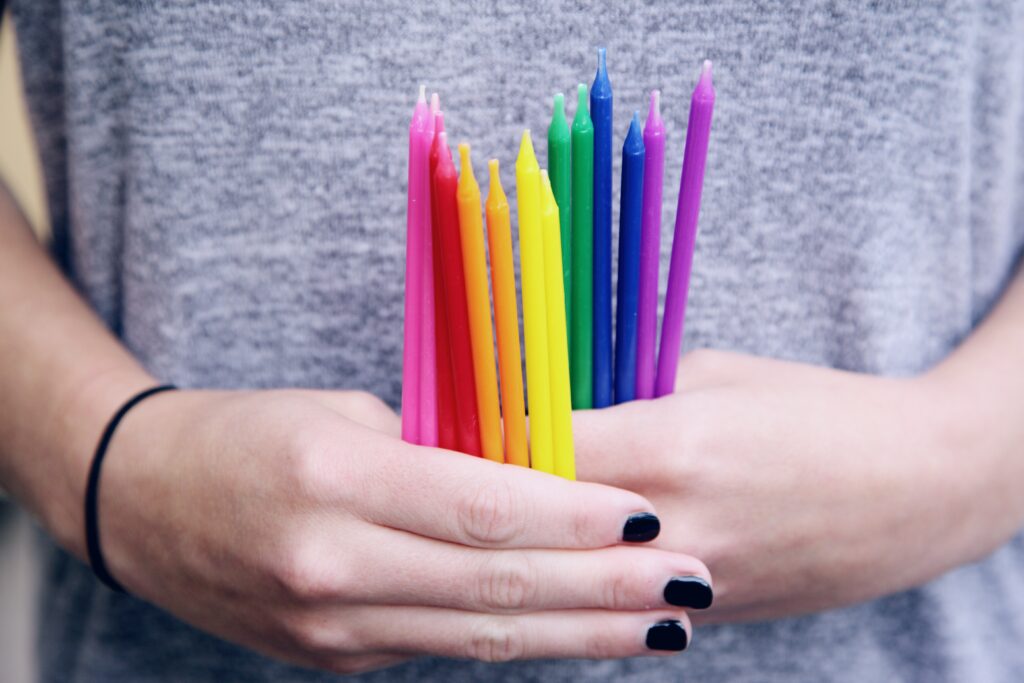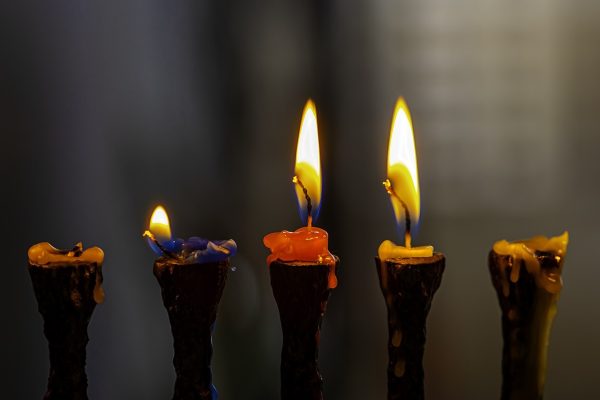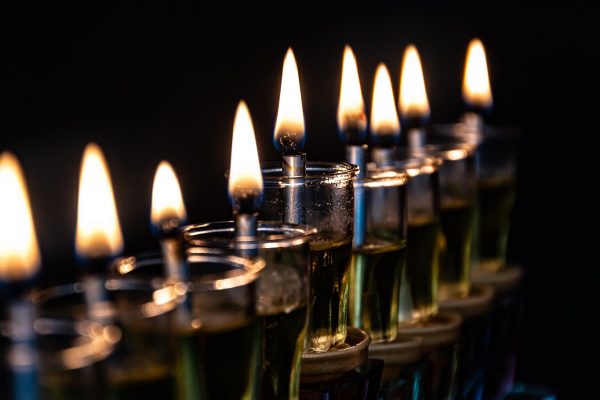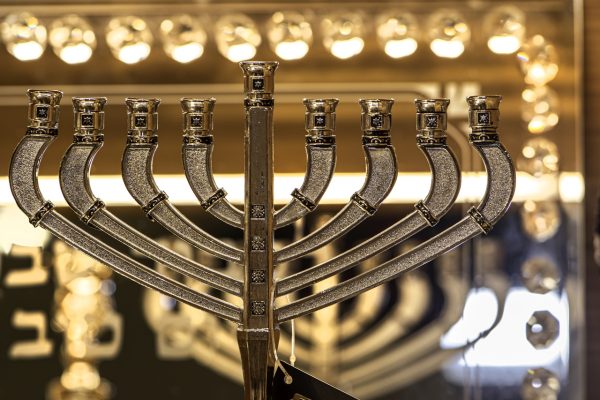| All three blessings are pronounced prior to lighting the candles. The third blessing is said only on the first night. New candles are added from right to left and lit from left to right. If feminine God-language is new to you, you might consider trying it out on the 7th night of Chanukah, Chag Habanot. (See Chag Habanot ritual.) |
בָּרוּךְ אַתָּה אֲדֹנָי אֱלֹהֵינוּ מֶלֶךְ הָעוֹלָם אֲשֶׁר קִדְּשָׁנוּ בְּמִצְוֹתָיו וְצִוָּנוּ לְהַדְלִיק נֵר שֶׁל חֲנֻכָּה
(G-d as masculine) Barukh Atah Adonai Eloheinu Melekh Ha’olam asher kidshanu bemitzvotav vetzivanu lehadlik ner shel Chanukah.
בְּרוּכָה אַתְּ יָהּ מְקוֹר הַחַיִּים אֲשֶׁר קִדַשְׁתַנוּ בְּמִצְוֹתֵיהָ וְצִוְתָנוּ לְהַדְלִיק נֵר שֶׁל חֲנֻכָּה
(G-d as feminine) Berukha At Yah Mekor Hakhayim asher kidashtanu bemitzvoteiha vetzivatnu lehadlik ner shel Chanukah.
Praised are You God, Source of Life, who makes us holy through your commandments and commands us to light the Hanukah candles.
בָּרוּךְ אַתָּה אֲדֹנָי אֱלֹהֵינוּ מֶלֶךְ הָעוֹלָם שֶׁעָשָׂה נִסִּים לַאֲבוֹתֵינוּ בַּיָּמִים הָהֵם בַּזְּמָן הַזֶּה
(G-d as masculine) Barukh Atah Adonai Eloheinu Melekh Ha’olam she’asah nisim l’avoteinu bayamim hahem bazman hazeh.
בְּרוּכָה אַתְּ יָהּ מְקוֹר הַחַיִּים שֶׁעָשְׂתָה נִסִּים לְאִמוֹתֵינוּ וְלַאֲבוֹתֵינוּ בַּיָּמִים הָהֵם בַּזְּמָן הַזֶּה
(G-d as feminine) Berukha Aht Yah Mekor Hakhayim she’astah nisim le’imoteynu vela’avoteinu bayamim hahem bazman hazeh.
Praised are You God, Source of Life, who performed miracles for our ancestors in their day at this season.
Recited the first night only:
בָּרוּךְ אַתָּה אֲדֹנָי אֱלֹהֵינוּ מֶלֶךְ הָעוֹלָם, שֶׁהֶחֱיָנוּ וְקִיְּמָנוּ וְהִגִּיעָנוּ לַזְּמָן הַזֶּה
(G-d as masculine) Barukh Atah Adonai Eloheinu Melekh Ha’olam shehekheyanu ve’kiyemanu ve’higianu lazman hazeh.
בְּרוּכָה אַתְּ יָהּ אֱלֹהֵינוּ רוּחַ הָעוֹלָם שֶׁהֶחֱיָתְנוּ וְקִיְּמָתְנוּ וְהִגִּיעָתְנוּ לַזְּמָן הַזֶּה
(G-d as feminine) Berukha Aht Yah Mekor Hakhayim shehekheyatnu vekiyematnu vehigi’atnu lazman hazeh.
Praised are You God, Source of Life, who keeps us alive, sustains us, and brings us to this moment.
The following, Hanerot Halalu, is recited or sung after the candles are lit.
Hanerot halalu anakhnu madlikin al hanisim ve’al hanifla’ot ve’al hateshu’ot ve’al hamilkhamot she’asit le’imoteinu velavoteinu bayamim hahem bazman hazeh al yedei kohanayikh hakedoshim uvekhol dorot ameh al yedei kol eleh shehidliku nerot hashra’ah tikvah veshalom.
Vekhol shmonat yemei Chanukah hanerot halalu kodesh hem ve’ein lanu reshut lehishtamesh bahem elah lirotam bilvad kedei lehodot ulhalel lishmeh hagadol al nisayikh ve’al nifle’otayikh ve’al yeshuateh.
These lights we kindle
for the miracles and the wonders and
the salvations and the victories that You performed for our ancestors
in their day at this season,
through Your holy priests,
and in every generation of Your people,
through all who kindled lights
of inspiration, hope, and peace.
All eight days of Chanukah,
these candles are holy.
We are not permitted to use their light,
but only to look at them and
to appreciate and to praise Your great name
for Your miracles,
Your wonders, and
Your salvations.
Commentary:
- miracles and wonders… of salvations and of victories: this section refers to the many aspects of Jewish history and legend that we acknowledge at Hanukah. Some recent versions of this prayer express thanks for nehamot (comfort) in lieu of milhamot (wars or victories) because of its more peaceful message. If we choose to acknowledge our military victories, let us consciously commemorate those of both the Maccabees and the less well-known heroine, Judith.
- performed for our ancestors: in Hebrew, the word “imoteynu” (mothers) is added alongside the word “avoteynu” (fathers), thereby including all of our ancestors.
- and in every generation… and peace. Traditionally, this prayer highlights only two types of role models – military victors, such as the Maccabees and Judith, and high priests, who were involved in the miracle of the oil in the Temple. Kolot’s version of the prayer adds, “all who kindled lights of inspiration, hope, and peace” in order to expand the range of role models and miracle-makers from our past.
As we light candles to celebrate the sacredness of light and the mystery of darkness, we experience a moment of infinite possibility that has been shared by Jews of all genders in every generation.












